Implementation of IFRS
VerifiedAdded on 2023/01/16
|7
|2506
|56
AI Summary
This report discusses the implementation of IFRS (International Financial Reporting Standards) and its impact on the global economy. It covers the challenges faced by developing economies, the benefits of adopting IFRS, and the importance of harmonization. The report also explores the transition from GAAP to IFRS and the role of auditors and stakeholders in the process. Overall, it provides a comprehensive analysis of the implementation of IFRS and its implications.
Contribute Materials
Your contribution can guide someone’s learning journey. Share your
documents today.
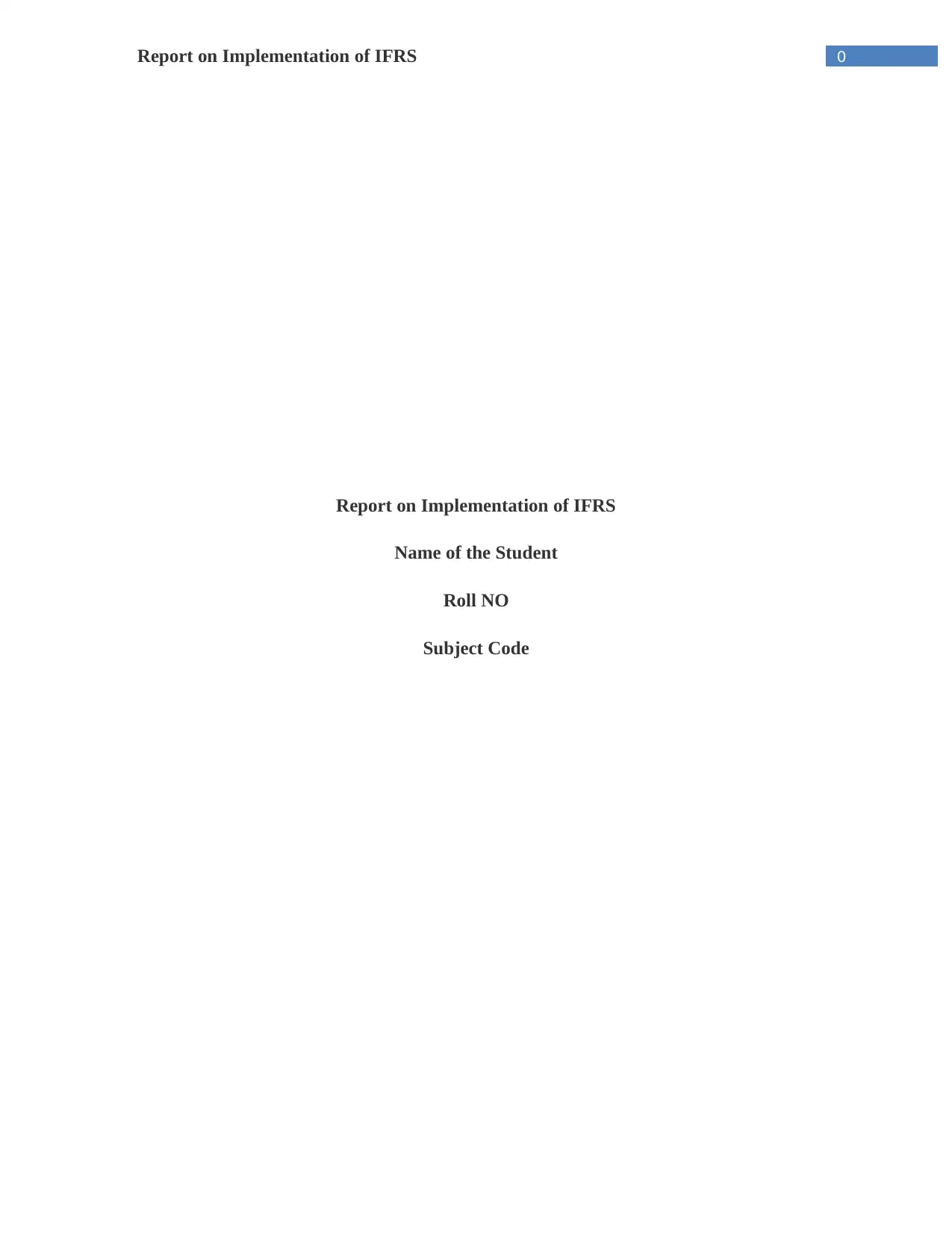
0Report on Implementation of IFRS
Report on Implementation of IFRS
Name of the Student
Roll NO
Subject Code
Report on Implementation of IFRS
Name of the Student
Roll NO
Subject Code
Secure Best Marks with AI Grader
Need help grading? Try our AI Grader for instant feedback on your assignments.
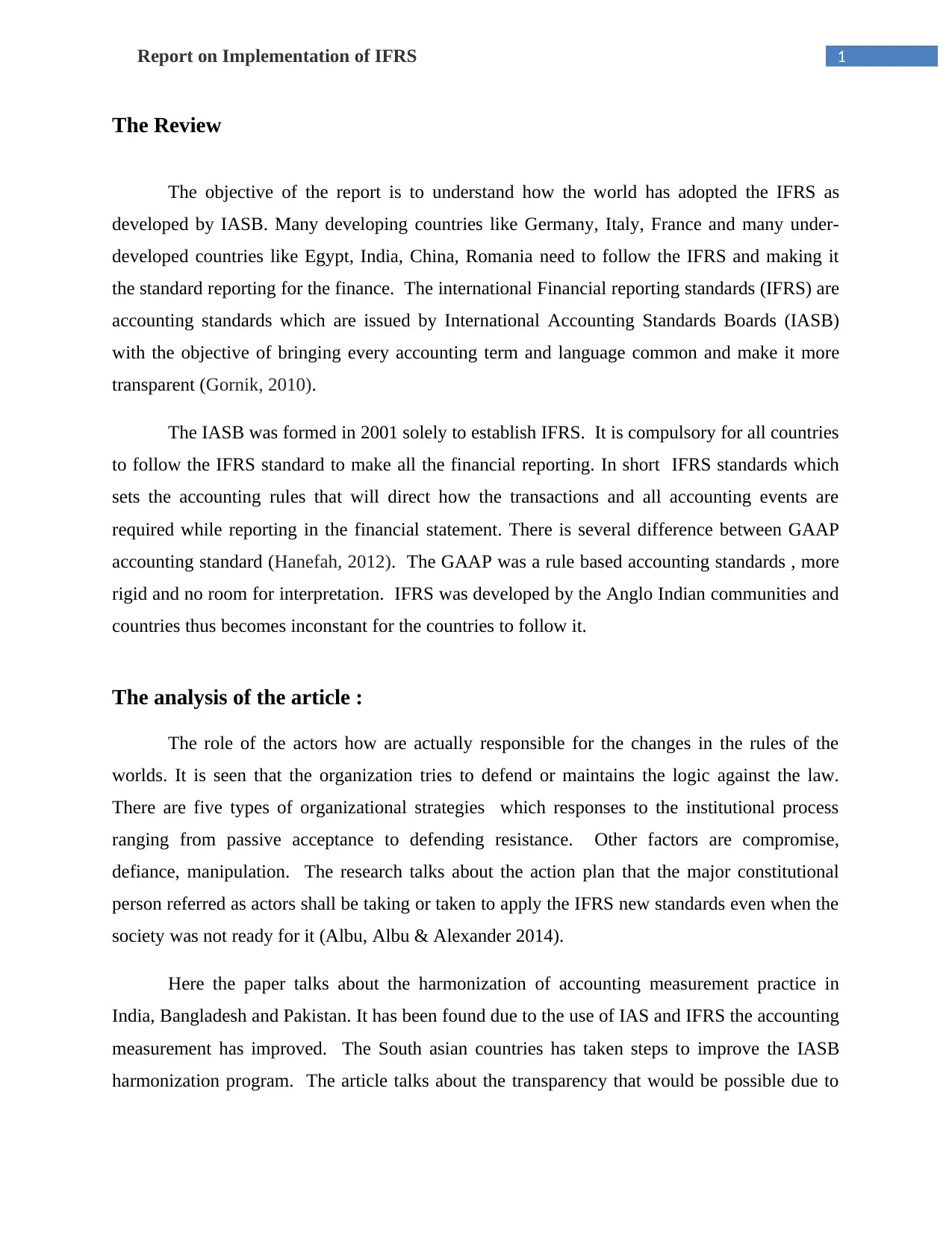
1Report on Implementation of IFRS
The Review
The objective of the report is to understand how the world has adopted the IFRS as
developed by IASB. Many developing countries like Germany, Italy, France and many under-
developed countries like Egypt, India, China, Romania need to follow the IFRS and making it
the standard reporting for the finance. The international Financial reporting standards (IFRS) are
accounting standards which are issued by International Accounting Standards Boards (IASB)
with the objective of bringing every accounting term and language common and make it more
transparent (Gornik, 2010).
The IASB was formed in 2001 solely to establish IFRS. It is compulsory for all countries
to follow the IFRS standard to make all the financial reporting. In short IFRS standards which
sets the accounting rules that will direct how the transactions and all accounting events are
required while reporting in the financial statement. There is several difference between GAAP
accounting standard (Hanefah, 2012). The GAAP was a rule based accounting standards , more
rigid and no room for interpretation. IFRS was developed by the Anglo Indian communities and
countries thus becomes inconstant for the countries to follow it.
The analysis of the article :
The role of the actors how are actually responsible for the changes in the rules of the
worlds. It is seen that the organization tries to defend or maintains the logic against the law.
There are five types of organizational strategies which responses to the institutional process
ranging from passive acceptance to defending resistance. Other factors are compromise,
defiance, manipulation. The research talks about the action plan that the major constitutional
person referred as actors shall be taking or taken to apply the IFRS new standards even when the
society was not ready for it (Albu, Albu & Alexander 2014).
Here the paper talks about the harmonization of accounting measurement practice in
India, Bangladesh and Pakistan. It has been found due to the use of IAS and IFRS the accounting
measurement has improved. The South asian countries has taken steps to improve the IASB
harmonization program. The article talks about the transparency that would be possible due to
The Review
The objective of the report is to understand how the world has adopted the IFRS as
developed by IASB. Many developing countries like Germany, Italy, France and many under-
developed countries like Egypt, India, China, Romania need to follow the IFRS and making it
the standard reporting for the finance. The international Financial reporting standards (IFRS) are
accounting standards which are issued by International Accounting Standards Boards (IASB)
with the objective of bringing every accounting term and language common and make it more
transparent (Gornik, 2010).
The IASB was formed in 2001 solely to establish IFRS. It is compulsory for all countries
to follow the IFRS standard to make all the financial reporting. In short IFRS standards which
sets the accounting rules that will direct how the transactions and all accounting events are
required while reporting in the financial statement. There is several difference between GAAP
accounting standard (Hanefah, 2012). The GAAP was a rule based accounting standards , more
rigid and no room for interpretation. IFRS was developed by the Anglo Indian communities and
countries thus becomes inconstant for the countries to follow it.
The analysis of the article :
The role of the actors how are actually responsible for the changes in the rules of the
worlds. It is seen that the organization tries to defend or maintains the logic against the law.
There are five types of organizational strategies which responses to the institutional process
ranging from passive acceptance to defending resistance. Other factors are compromise,
defiance, manipulation. The research talks about the action plan that the major constitutional
person referred as actors shall be taking or taken to apply the IFRS new standards even when the
society was not ready for it (Albu, Albu & Alexander 2014).
Here the paper talks about the harmonization of accounting measurement practice in
India, Bangladesh and Pakistan. It has been found due to the use of IAS and IFRS the accounting
measurement has improved. The South asian countries has taken steps to improve the IASB
harmonization program. The article talks about the transparency that would be possible due to
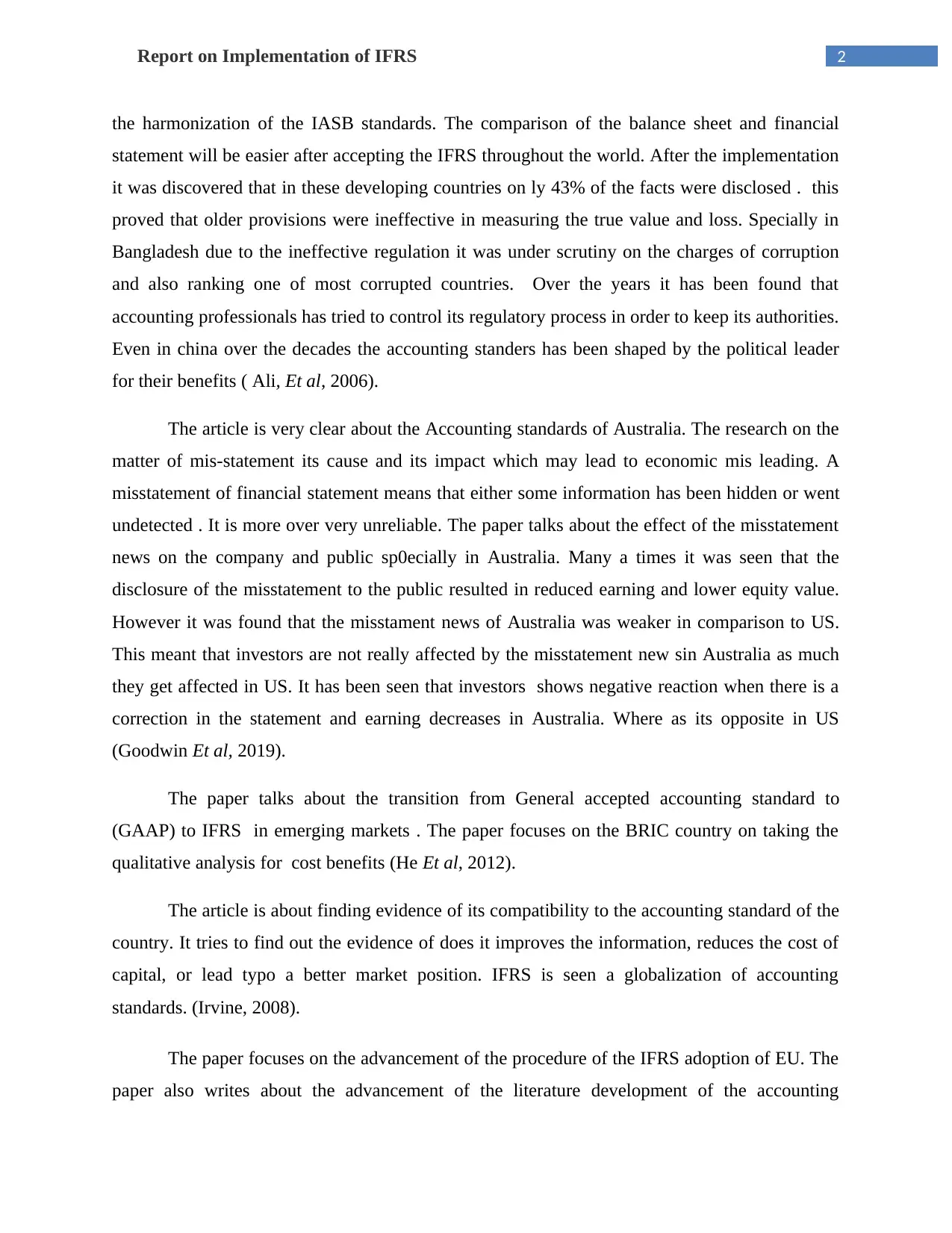
2Report on Implementation of IFRS
the harmonization of the IASB standards. The comparison of the balance sheet and financial
statement will be easier after accepting the IFRS throughout the world. After the implementation
it was discovered that in these developing countries on ly 43% of the facts were disclosed . this
proved that older provisions were ineffective in measuring the true value and loss. Specially in
Bangladesh due to the ineffective regulation it was under scrutiny on the charges of corruption
and also ranking one of most corrupted countries. Over the years it has been found that
accounting professionals has tried to control its regulatory process in order to keep its authorities.
Even in china over the decades the accounting standers has been shaped by the political leader
for their benefits ( Ali, Et al, 2006).
The article is very clear about the Accounting standards of Australia. The research on the
matter of mis-statement its cause and its impact which may lead to economic mis leading. A
misstatement of financial statement means that either some information has been hidden or went
undetected . It is more over very unreliable. The paper talks about the effect of the misstatement
news on the company and public sp0ecially in Australia. Many a times it was seen that the
disclosure of the misstatement to the public resulted in reduced earning and lower equity value.
However it was found that the misstament news of Australia was weaker in comparison to US.
This meant that investors are not really affected by the misstatement new sin Australia as much
they get affected in US. It has been seen that investors shows negative reaction when there is a
correction in the statement and earning decreases in Australia. Where as its opposite in US
(Goodwin Et al, 2019).
The paper talks about the transition from General accepted accounting standard to
(GAAP) to IFRS in emerging markets . The paper focuses on the BRIC country on taking the
qualitative analysis for cost benefits (He Et al, 2012).
The article is about finding evidence of its compatibility to the accounting standard of the
country. It tries to find out the evidence of does it improves the information, reduces the cost of
capital, or lead typo a better market position. IFRS is seen a globalization of accounting
standards. (Irvine, 2008).
The paper focuses on the advancement of the procedure of the IFRS adoption of EU. The
paper also writes about the advancement of the literature development of the accounting
the harmonization of the IASB standards. The comparison of the balance sheet and financial
statement will be easier after accepting the IFRS throughout the world. After the implementation
it was discovered that in these developing countries on ly 43% of the facts were disclosed . this
proved that older provisions were ineffective in measuring the true value and loss. Specially in
Bangladesh due to the ineffective regulation it was under scrutiny on the charges of corruption
and also ranking one of most corrupted countries. Over the years it has been found that
accounting professionals has tried to control its regulatory process in order to keep its authorities.
Even in china over the decades the accounting standers has been shaped by the political leader
for their benefits ( Ali, Et al, 2006).
The article is very clear about the Accounting standards of Australia. The research on the
matter of mis-statement its cause and its impact which may lead to economic mis leading. A
misstatement of financial statement means that either some information has been hidden or went
undetected . It is more over very unreliable. The paper talks about the effect of the misstatement
news on the company and public sp0ecially in Australia. Many a times it was seen that the
disclosure of the misstatement to the public resulted in reduced earning and lower equity value.
However it was found that the misstament news of Australia was weaker in comparison to US.
This meant that investors are not really affected by the misstatement new sin Australia as much
they get affected in US. It has been seen that investors shows negative reaction when there is a
correction in the statement and earning decreases in Australia. Where as its opposite in US
(Goodwin Et al, 2019).
The paper talks about the transition from General accepted accounting standard to
(GAAP) to IFRS in emerging markets . The paper focuses on the BRIC country on taking the
qualitative analysis for cost benefits (He Et al, 2012).
The article is about finding evidence of its compatibility to the accounting standard of the
country. It tries to find out the evidence of does it improves the information, reduces the cost of
capital, or lead typo a better market position. IFRS is seen a globalization of accounting
standards. (Irvine, 2008).
The paper focuses on the advancement of the procedure of the IFRS adoption of EU. The
paper also writes about the advancement of the literature development of the accounting
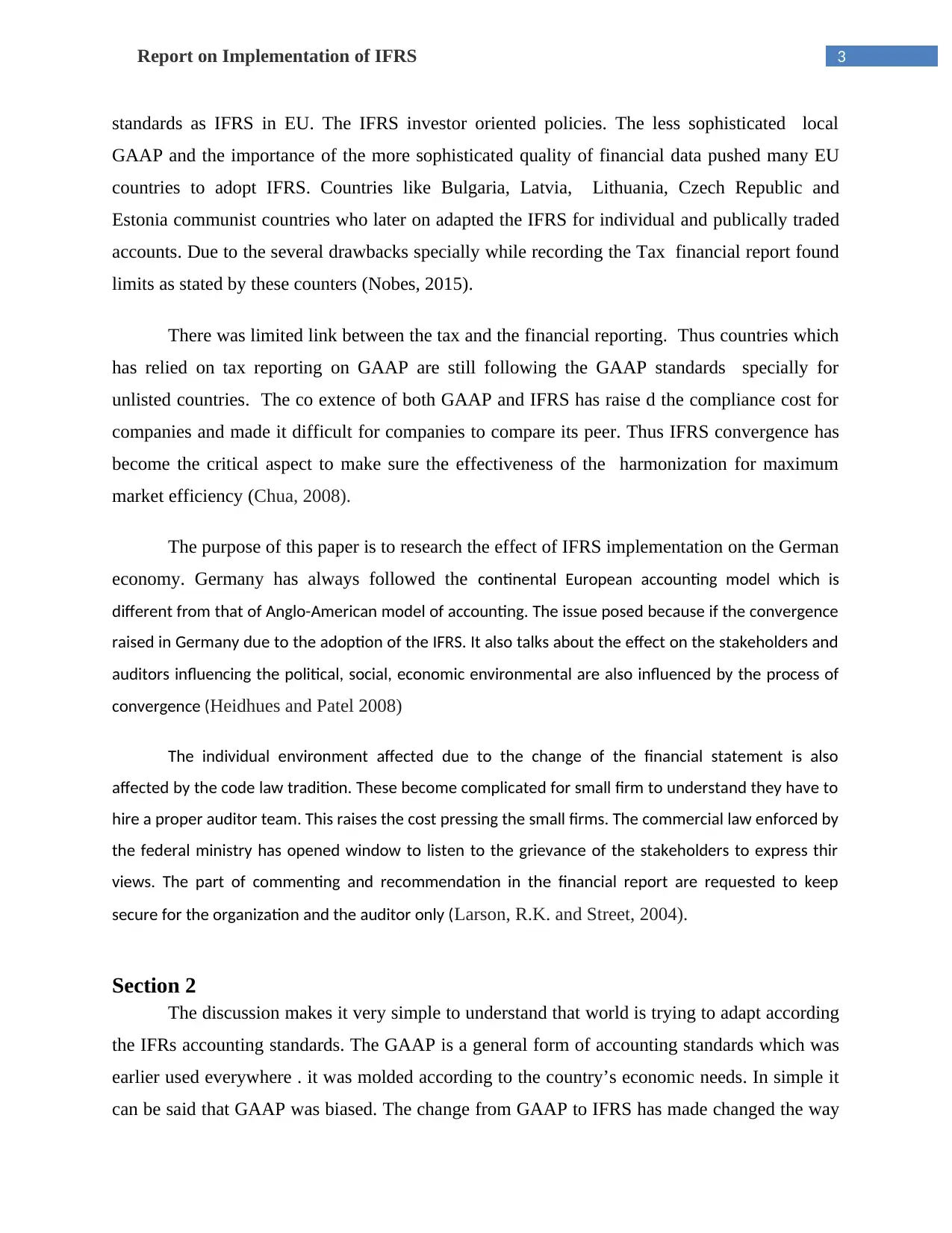
3Report on Implementation of IFRS
standards as IFRS in EU. The IFRS investor oriented policies. The less sophisticated local
GAAP and the importance of the more sophisticated quality of financial data pushed many EU
countries to adopt IFRS. Countries like Bulgaria, Latvia, Lithuania, Czech Republic and
Estonia communist countries who later on adapted the IFRS for individual and publically traded
accounts. Due to the several drawbacks specially while recording the Tax financial report found
limits as stated by these counters (Nobes, 2015).
There was limited link between the tax and the financial reporting. Thus countries which
has relied on tax reporting on GAAP are still following the GAAP standards specially for
unlisted countries. The co extence of both GAAP and IFRS has raise d the compliance cost for
companies and made it difficult for companies to compare its peer. Thus IFRS convergence has
become the critical aspect to make sure the effectiveness of the harmonization for maximum
market efficiency (Chua, 2008).
The purpose of this paper is to research the effect of IFRS implementation on the German
economy. Germany has always followed the continental European accounting model which is
different from that of Anglo-American model of accounting. The issue posed because if the convergence
raised in Germany due to the adoption of the IFRS. It also talks about the effect on the stakeholders and
auditors influencing the political, social, economic environmental are also influenced by the process of
convergence (Heidhues and Patel 2008)
The individual environment affected due to the change of the financial statement is also
affected by the code law tradition. These become complicated for small firm to understand they have to
hire a proper auditor team. This raises the cost pressing the small firms. The commercial law enforced by
the federal ministry has opened window to listen to the grievance of the stakeholders to express thir
views. The part of commenting and recommendation in the financial report are requested to keep
secure for the organization and the auditor only (Larson, R.K. and Street, 2004).
Section 2
The discussion makes it very simple to understand that world is trying to adapt according
the IFRs accounting standards. The GAAP is a general form of accounting standards which was
earlier used everywhere . it was molded according to the country’s economic needs. In simple it
can be said that GAAP was biased. The change from GAAP to IFRS has made changed the way
standards as IFRS in EU. The IFRS investor oriented policies. The less sophisticated local
GAAP and the importance of the more sophisticated quality of financial data pushed many EU
countries to adopt IFRS. Countries like Bulgaria, Latvia, Lithuania, Czech Republic and
Estonia communist countries who later on adapted the IFRS for individual and publically traded
accounts. Due to the several drawbacks specially while recording the Tax financial report found
limits as stated by these counters (Nobes, 2015).
There was limited link between the tax and the financial reporting. Thus countries which
has relied on tax reporting on GAAP are still following the GAAP standards specially for
unlisted countries. The co extence of both GAAP and IFRS has raise d the compliance cost for
companies and made it difficult for companies to compare its peer. Thus IFRS convergence has
become the critical aspect to make sure the effectiveness of the harmonization for maximum
market efficiency (Chua, 2008).
The purpose of this paper is to research the effect of IFRS implementation on the German
economy. Germany has always followed the continental European accounting model which is
different from that of Anglo-American model of accounting. The issue posed because if the convergence
raised in Germany due to the adoption of the IFRS. It also talks about the effect on the stakeholders and
auditors influencing the political, social, economic environmental are also influenced by the process of
convergence (Heidhues and Patel 2008)
The individual environment affected due to the change of the financial statement is also
affected by the code law tradition. These become complicated for small firm to understand they have to
hire a proper auditor team. This raises the cost pressing the small firms. The commercial law enforced by
the federal ministry has opened window to listen to the grievance of the stakeholders to express thir
views. The part of commenting and recommendation in the financial report are requested to keep
secure for the organization and the auditor only (Larson, R.K. and Street, 2004).
Section 2
The discussion makes it very simple to understand that world is trying to adapt according
the IFRs accounting standards. The GAAP is a general form of accounting standards which was
earlier used everywhere . it was molded according to the country’s economic needs. In simple it
can be said that GAAP was biased. The change from GAAP to IFRS has made changed the way
Secure Best Marks with AI Grader
Need help grading? Try our AI Grader for instant feedback on your assignments.
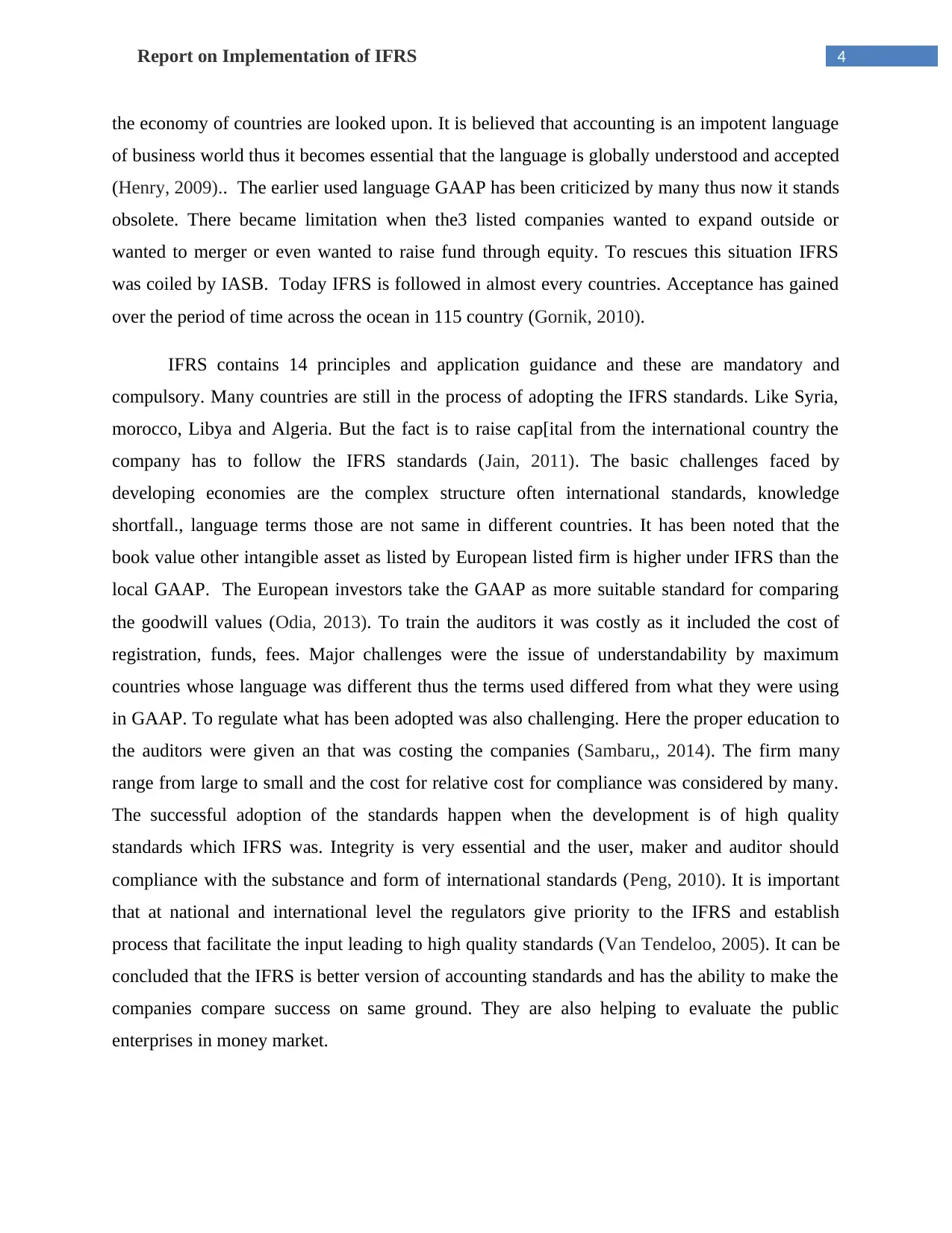
4Report on Implementation of IFRS
the economy of countries are looked upon. It is believed that accounting is an impotent language
of business world thus it becomes essential that the language is globally understood and accepted
(Henry, 2009).. The earlier used language GAAP has been criticized by many thus now it stands
obsolete. There became limitation when the3 listed companies wanted to expand outside or
wanted to merger or even wanted to raise fund through equity. To rescues this situation IFRS
was coiled by IASB. Today IFRS is followed in almost every countries. Acceptance has gained
over the period of time across the ocean in 115 country (Gornik, 2010).
IFRS contains 14 principles and application guidance and these are mandatory and
compulsory. Many countries are still in the process of adopting the IFRS standards. Like Syria,
morocco, Libya and Algeria. But the fact is to raise cap[ital from the international country the
company has to follow the IFRS standards (Jain, 2011). The basic challenges faced by
developing economies are the complex structure often international standards, knowledge
shortfall., language terms those are not same in different countries. It has been noted that the
book value other intangible asset as listed by European listed firm is higher under IFRS than the
local GAAP. The European investors take the GAAP as more suitable standard for comparing
the goodwill values (Odia, 2013). To train the auditors it was costly as it included the cost of
registration, funds, fees. Major challenges were the issue of understandability by maximum
countries whose language was different thus the terms used differed from what they were using
in GAAP. To regulate what has been adopted was also challenging. Here the proper education to
the auditors were given an that was costing the companies (Sambaru,, 2014). The firm many
range from large to small and the cost for relative cost for compliance was considered by many.
The successful adoption of the standards happen when the development is of high quality
standards which IFRS was. Integrity is very essential and the user, maker and auditor should
compliance with the substance and form of international standards (Peng, 2010). It is important
that at national and international level the regulators give priority to the IFRS and establish
process that facilitate the input leading to high quality standards (Van Tendeloo, 2005). It can be
concluded that the IFRS is better version of accounting standards and has the ability to make the
companies compare success on same ground. They are also helping to evaluate the public
enterprises in money market.
the economy of countries are looked upon. It is believed that accounting is an impotent language
of business world thus it becomes essential that the language is globally understood and accepted
(Henry, 2009).. The earlier used language GAAP has been criticized by many thus now it stands
obsolete. There became limitation when the3 listed companies wanted to expand outside or
wanted to merger or even wanted to raise fund through equity. To rescues this situation IFRS
was coiled by IASB. Today IFRS is followed in almost every countries. Acceptance has gained
over the period of time across the ocean in 115 country (Gornik, 2010).
IFRS contains 14 principles and application guidance and these are mandatory and
compulsory. Many countries are still in the process of adopting the IFRS standards. Like Syria,
morocco, Libya and Algeria. But the fact is to raise cap[ital from the international country the
company has to follow the IFRS standards (Jain, 2011). The basic challenges faced by
developing economies are the complex structure often international standards, knowledge
shortfall., language terms those are not same in different countries. It has been noted that the
book value other intangible asset as listed by European listed firm is higher under IFRS than the
local GAAP. The European investors take the GAAP as more suitable standard for comparing
the goodwill values (Odia, 2013). To train the auditors it was costly as it included the cost of
registration, funds, fees. Major challenges were the issue of understandability by maximum
countries whose language was different thus the terms used differed from what they were using
in GAAP. To regulate what has been adopted was also challenging. Here the proper education to
the auditors were given an that was costing the companies (Sambaru,, 2014). The firm many
range from large to small and the cost for relative cost for compliance was considered by many.
The successful adoption of the standards happen when the development is of high quality
standards which IFRS was. Integrity is very essential and the user, maker and auditor should
compliance with the substance and form of international standards (Peng, 2010). It is important
that at national and international level the regulators give priority to the IFRS and establish
process that facilitate the input leading to high quality standards (Van Tendeloo, 2005). It can be
concluded that the IFRS is better version of accounting standards and has the ability to make the
companies compare success on same ground. They are also helping to evaluate the public
enterprises in money market.
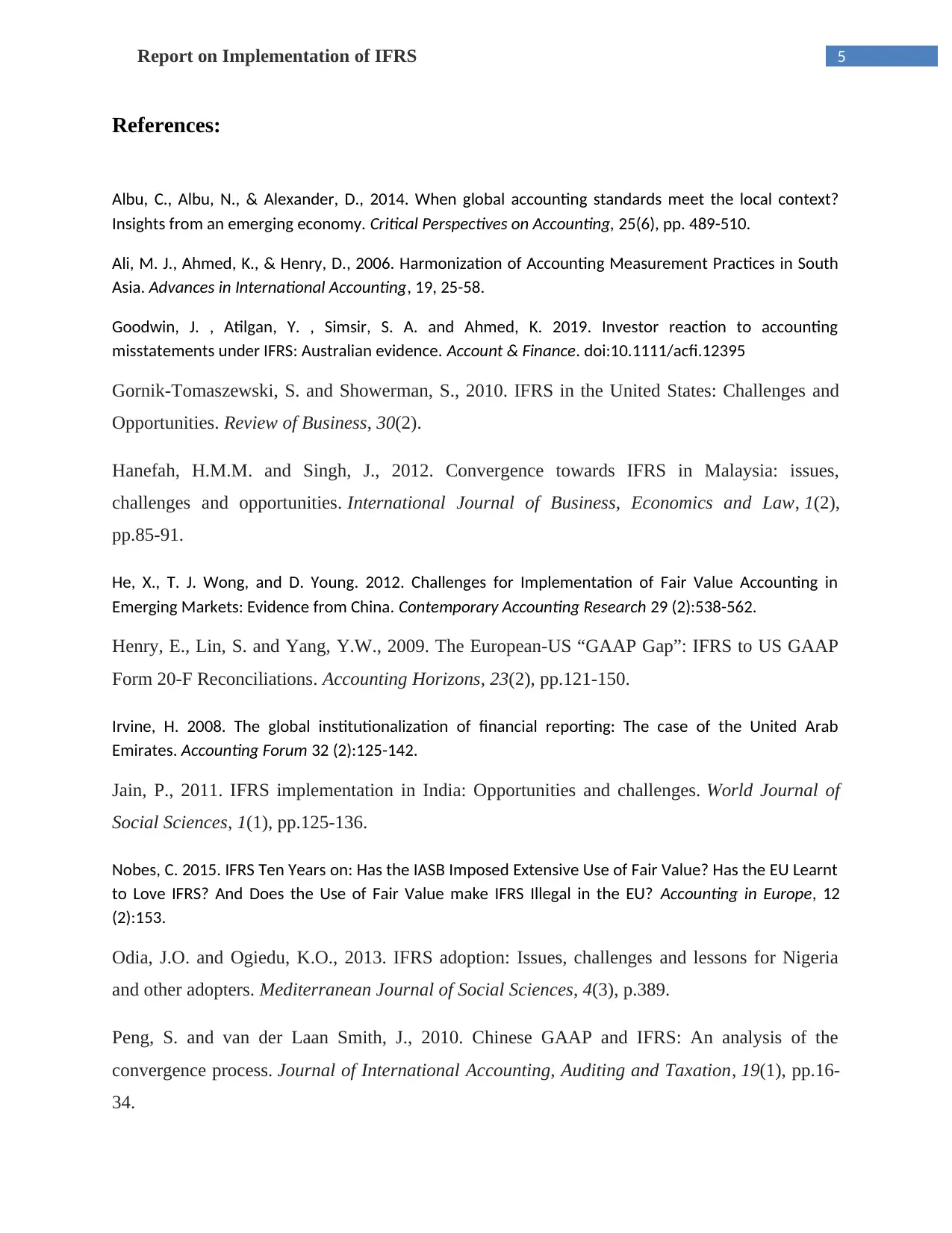
5Report on Implementation of IFRS
References:
Albu, C., Albu, N., & Alexander, D., 2014. When global accounting standards meet the local context?
Insights from an emerging economy. Critical Perspectives on Accounting, 25(6), pp. 489-510.
Ali, M. J., Ahmed, K., & Henry, D., 2006. Harmonization of Accounting Measurement Practices in South
Asia. Advances in International Accounting, 19, 25-58.
Goodwin, J. , Atilgan, Y. , Simsir, S. A. and Ahmed, K. 2019. Investor reaction to accounting
misstatements under IFRS: Australian evidence. Account & Finance. doi:10.1111/acfi.12395
Gornik-Tomaszewski, S. and Showerman, S., 2010. IFRS in the United States: Challenges and
Opportunities. Review of Business, 30(2).
Hanefah, H.M.M. and Singh, J., 2012. Convergence towards IFRS in Malaysia: issues,
challenges and opportunities. International Journal of Business, Economics and Law, 1(2),
pp.85-91.
He, X., T. J. Wong, and D. Young. 2012. Challenges for Implementation of Fair Value Accounting in
Emerging Markets: Evidence from China. Contemporary Accounting Research 29 (2):538-562.
Henry, E., Lin, S. and Yang, Y.W., 2009. The European-US “GAAP Gap”: IFRS to US GAAP
Form 20-F Reconciliations. Accounting Horizons, 23(2), pp.121-150.
Irvine, H. 2008. The global institutionalization of financial reporting: The case of the United Arab
Emirates. Accounting Forum 32 (2):125-142.
Jain, P., 2011. IFRS implementation in India: Opportunities and challenges. World Journal of
Social Sciences, 1(1), pp.125-136.
Nobes, C. 2015. IFRS Ten Years on: Has the IASB Imposed Extensive Use of Fair Value? Has the EU Learnt
to Love IFRS? And Does the Use of Fair Value make IFRS Illegal in the EU? Accounting in Europe, 12
(2):153.
Odia, J.O. and Ogiedu, K.O., 2013. IFRS adoption: Issues, challenges and lessons for Nigeria
and other adopters. Mediterranean Journal of Social Sciences, 4(3), p.389.
Peng, S. and van der Laan Smith, J., 2010. Chinese GAAP and IFRS: An analysis of the
convergence process. Journal of International Accounting, Auditing and Taxation, 19(1), pp.16-
34.
References:
Albu, C., Albu, N., & Alexander, D., 2014. When global accounting standards meet the local context?
Insights from an emerging economy. Critical Perspectives on Accounting, 25(6), pp. 489-510.
Ali, M. J., Ahmed, K., & Henry, D., 2006. Harmonization of Accounting Measurement Practices in South
Asia. Advances in International Accounting, 19, 25-58.
Goodwin, J. , Atilgan, Y. , Simsir, S. A. and Ahmed, K. 2019. Investor reaction to accounting
misstatements under IFRS: Australian evidence. Account & Finance. doi:10.1111/acfi.12395
Gornik-Tomaszewski, S. and Showerman, S., 2010. IFRS in the United States: Challenges and
Opportunities. Review of Business, 30(2).
Hanefah, H.M.M. and Singh, J., 2012. Convergence towards IFRS in Malaysia: issues,
challenges and opportunities. International Journal of Business, Economics and Law, 1(2),
pp.85-91.
He, X., T. J. Wong, and D. Young. 2012. Challenges for Implementation of Fair Value Accounting in
Emerging Markets: Evidence from China. Contemporary Accounting Research 29 (2):538-562.
Henry, E., Lin, S. and Yang, Y.W., 2009. The European-US “GAAP Gap”: IFRS to US GAAP
Form 20-F Reconciliations. Accounting Horizons, 23(2), pp.121-150.
Irvine, H. 2008. The global institutionalization of financial reporting: The case of the United Arab
Emirates. Accounting Forum 32 (2):125-142.
Jain, P., 2011. IFRS implementation in India: Opportunities and challenges. World Journal of
Social Sciences, 1(1), pp.125-136.
Nobes, C. 2015. IFRS Ten Years on: Has the IASB Imposed Extensive Use of Fair Value? Has the EU Learnt
to Love IFRS? And Does the Use of Fair Value make IFRS Illegal in the EU? Accounting in Europe, 12
(2):153.
Odia, J.O. and Ogiedu, K.O., 2013. IFRS adoption: Issues, challenges and lessons for Nigeria
and other adopters. Mediterranean Journal of Social Sciences, 4(3), p.389.
Peng, S. and van der Laan Smith, J., 2010. Chinese GAAP and IFRS: An analysis of the
convergence process. Journal of International Accounting, Auditing and Taxation, 19(1), pp.16-
34.
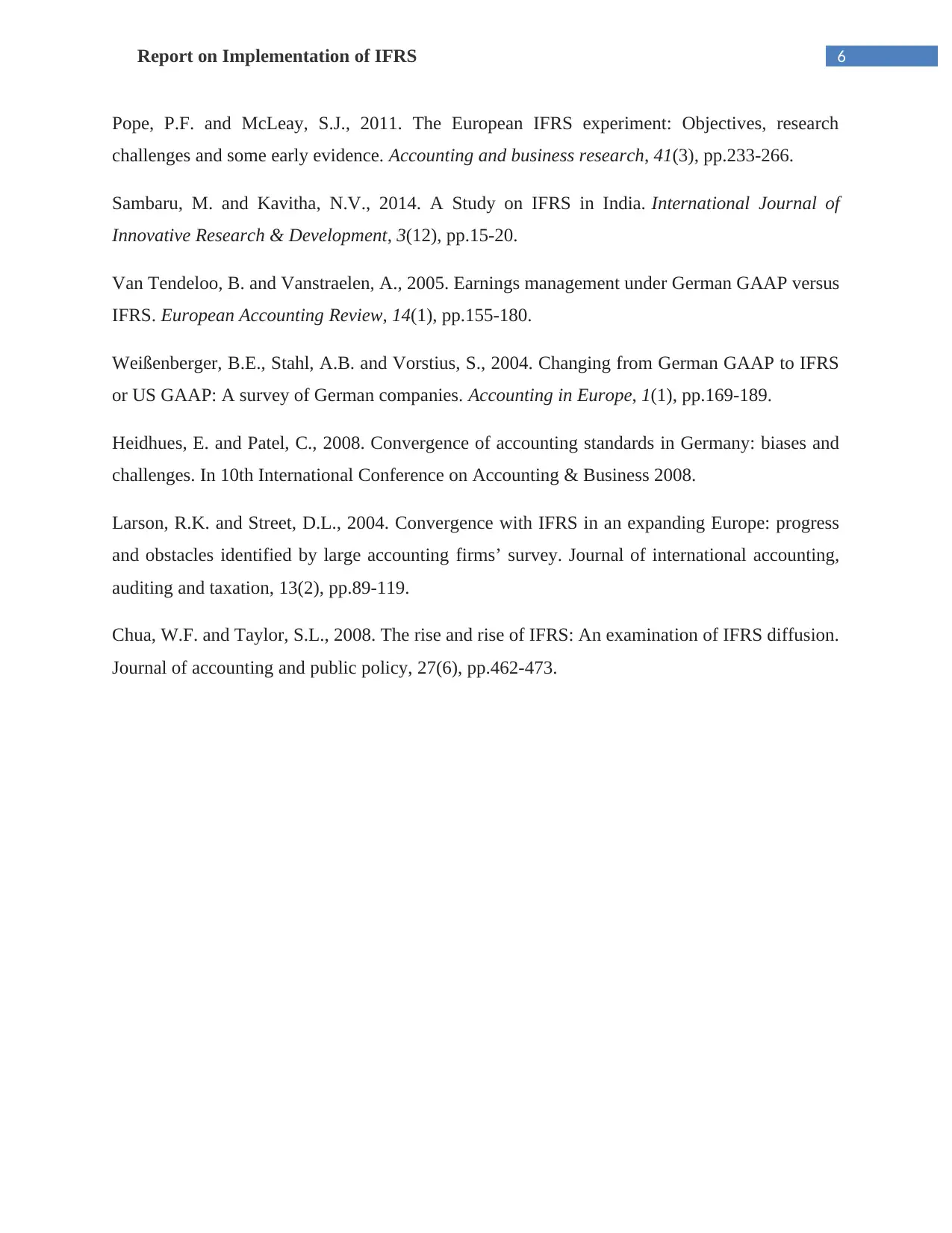
6Report on Implementation of IFRS
Pope, P.F. and McLeay, S.J., 2011. The European IFRS experiment: Objectives, research
challenges and some early evidence. Accounting and business research, 41(3), pp.233-266.
Sambaru, M. and Kavitha, N.V., 2014. A Study on IFRS in India. International Journal of
Innovative Research & Development, 3(12), pp.15-20.
Van Tendeloo, B. and Vanstraelen, A., 2005. Earnings management under German GAAP versus
IFRS. European Accounting Review, 14(1), pp.155-180.
Weißenberger, B.E., Stahl, A.B. and Vorstius, S., 2004. Changing from German GAAP to IFRS
or US GAAP: A survey of German companies. Accounting in Europe, 1(1), pp.169-189.
Heidhues, E. and Patel, C., 2008. Convergence of accounting standards in Germany: biases and
challenges. In 10th International Conference on Accounting & Business 2008.
Larson, R.K. and Street, D.L., 2004. Convergence with IFRS in an expanding Europe: progress
and obstacles identified by large accounting firms’ survey. Journal of international accounting,
auditing and taxation, 13(2), pp.89-119.
Chua, W.F. and Taylor, S.L., 2008. The rise and rise of IFRS: An examination of IFRS diffusion.
Journal of accounting and public policy, 27(6), pp.462-473.
Pope, P.F. and McLeay, S.J., 2011. The European IFRS experiment: Objectives, research
challenges and some early evidence. Accounting and business research, 41(3), pp.233-266.
Sambaru, M. and Kavitha, N.V., 2014. A Study on IFRS in India. International Journal of
Innovative Research & Development, 3(12), pp.15-20.
Van Tendeloo, B. and Vanstraelen, A., 2005. Earnings management under German GAAP versus
IFRS. European Accounting Review, 14(1), pp.155-180.
Weißenberger, B.E., Stahl, A.B. and Vorstius, S., 2004. Changing from German GAAP to IFRS
or US GAAP: A survey of German companies. Accounting in Europe, 1(1), pp.169-189.
Heidhues, E. and Patel, C., 2008. Convergence of accounting standards in Germany: biases and
challenges. In 10th International Conference on Accounting & Business 2008.
Larson, R.K. and Street, D.L., 2004. Convergence with IFRS in an expanding Europe: progress
and obstacles identified by large accounting firms’ survey. Journal of international accounting,
auditing and taxation, 13(2), pp.89-119.
Chua, W.F. and Taylor, S.L., 2008. The rise and rise of IFRS: An examination of IFRS diffusion.
Journal of accounting and public policy, 27(6), pp.462-473.
1 out of 7
Related Documents
Your All-in-One AI-Powered Toolkit for Academic Success.
+13062052269
info@desklib.com
Available 24*7 on WhatsApp / Email
![[object Object]](/_next/static/media/star-bottom.7253800d.svg)
Unlock your academic potential
© 2024 | Zucol Services PVT LTD | All rights reserved.





